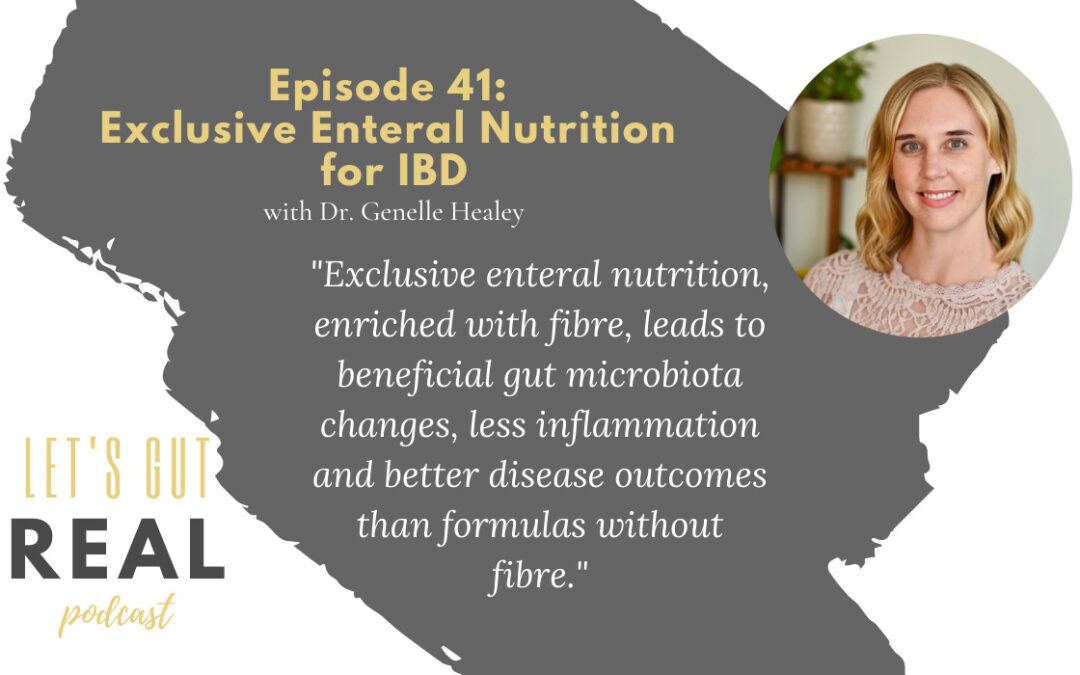Even though there is no known cure or cause of IBD there is promising research currently looking at the role of the Mediterranean diet in IBD treatment. Furthermore, Exclusive Enteral nutrition (EEN), enriched with fibre, leads to beneficial changes in the gut microbiome, less inflammation and better disease outcomes for IBD patients than exclusive enteral nutrition without fibre.
Nutrition Pearls for Exclusive Enteral Nutrition (EEN) and IBD
- IBD is a state of chronic inflammation of the intestinal tract that has a relapsing nature going from active to inactive inflammation
- Sub types of IBD include Crohn’s disease and ulcerative colitis
- Nutrition is likely a key factor in the development of IBD
- Patients with IBD have a different gut microbiome compared to those without IBD
- Dietary fibre affects the gut microbiota in IBD
- EEN liquid formula can either be taken orally or via a feeding tube
- EEN compared with steroid medication provides comparable or sometimes better outcomes in children and is considered first line of treatment for children with active Crohn’s disease
- It doesn’t appear to make a difference whether EEN formulas includes additives or not
- When patients start EEN it leads to a dramatic shift in the gut microbiome away from a healthy profile
- More research needs to be done to really understand why EEN leads to dramatic reduction in inflammation and approves disease outcomes in patients
Our diet, the balance of our gut microbiome, and fibre intake can have significant impacts on our digestive health and disease outcomes. This week I interview Dr. Genelle Healey on the use of exclusive enteral nutrition (EEN) treatment for IBD patients.
Dr Genelle Healey undertook her PhD in Nutritional Science at Massey University in New Zealand. Her research looked at what influence habitual dietary fibre intake has on gut microbiota response to a prebiotic (fibre) intervention. Prior to commencing her PhD, Genelle worked as a New Zealand registered Dietitian caring for patients with various diseases including gastrointestinal cancer, inflammatory bowel disease (IBD), renal disease and diabetes.
In 2017, Genelle moved to Vancouver to start a postdoctoral fellowship at University of British Columbia. The focus of her research is to better understand the impact nutrition, particularly fibre, has on the gut microbiome and disease outcomes for patients with IBD. During her postdoctoral fellowship she utilized models of IBD to investigate the therapeutic potential of novel nutritional interventions with the hope that these therapies can one day be used to positively impact the health and wellbeing of patients with IBD. Specifically, she has demonstrated that exclusive enteral nutrition (EEN) enriched with fibre leads to beneficial changes in the gut microbiome, less inflammation and better disease outcomes compared to EEN without fibre.
We talk about:
- How Healey became interested in the field of digestive health
- What IBD is
- How diet plays a role in the management of IBD
- Some prescriptive diets that could put a patient into remission.
- The role of ‘enteral nutrition’ in IBD
- The difference between PEN and EEN
- The mechanism of action in which we believe PEN/EEN can induce remission in IBD patients
- How the gut microbiome is involved
- The formulas used in IBD management and their ingredients, including emulsifiers
- The overall complexity of IBD
Connect with Healey on her researchgate profile or on Twitter



Recent Comments